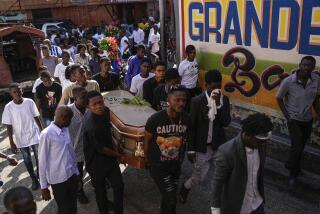Sudanese Bring Tears, Not Rage, to Funeral
- Share via
JUBA, Sudan — John Garang, the rebel-turned-peacemaker who led southern Sudan in a 21-year civil war, was laid to rest here Saturday amid an outpouring of grief, but without the deadly violence that had rocked the African nation earlier in the week.
Garang was killed July 30 in a helicopter crash in the mountains of southern Sudan, less than a month after being inaugurated as Sudan’s first vice president. In subsequent days, at least 130 people were killed in rioting fueled by suspicions that he had been a victim of foul play.
Garang was eulogized Saturday as a Moses-like figure who had liberated disenfranchised Sudanese but had not lived to see the fruits of his struggle.
“As sure as day follows night, the torch he has kindled shall not be extinguished. Not under my command,” said Garang’s deputy, Salva Keer, who has assumed leadership of the Sudan People’s Liberation Movement.
Garang, 60, took office July 9 under a landmark power-sharing agreement with the Islamist regime in Khartoum. Keer, the last surviving founder of the SPLM, is expected to be sworn in as vice president today.
Several thousand mourners lined the streets and flooded the courtyard of All Saints Cathedral here in Juba, a government-controlled regional capital that Garang had several times attempted to invade during his rebellion.
“It’s ironic. He finally took Juba,” said Danny Effie, publisher of Sudan Mirror newspaper and a friend of Garang.
The inter-faith funeral service ended at a granite and mud-brick tomb near the future home of the southern Sudanese parliament. In keeping with Garang’s Dinka tribal tradition, his son helped dig the grave before Garang’s coffin was brought to the site.
Grief and sadness gripped the city. Mourners stood along hot, dusty roads to pay their respects as a procession of cars and trucks passed.
During the church services, members of the choir were barely able to sing. Their voices cracked with emotion and tears streamed down their faces during a specially written ode to Garang.
“It was not his time to die,” said Agnes Lion, 21, choking back tears as Garang’s coffin was brought to the burial site. “He was a man of justice, equality and unity. He did not want the Sudan people to be divided. We are one family.”
The orderly atmosphere and talk of unity was in stark contrast to the nationwide spasm of rioting and looting that followed news of Garang’s death. Many young southern men, believing that the helicopter crash was not an accident, took out their anger on Arab-owned businesses.
Nearly a dozen were killed in Juba, and hundreds of Arabs fled the city in advance of the funeral.
On Saturday, government soldiers with rifles stood guard at the airport and peered down at the funeral service from church towers.
Tensions mounted after Ugandan President Yoweri Museveni told mourners Friday in a Sudanese town south of here that the helicopter crash could have been caused by an “external factor,” which many took as a suggestion that the crash was not accidental.
But Sudanese and SPLM officials, along with Garang’s widow, have said it appeared that the helicopter had crashed into a mountaintop while attempting an emergency landing in bad weather.
Sudanese President Omar Hassan Ahmed Bashir has launched an internationally supervised inquiry into the incident. He vowed to not let violence derail the peace process.
“We say to our brother Salva Keer that we will remain hand-in-hand to apply the peace agreement to the letter,” the Sudanese president said.
In a symbolic gesture at the end of his eulogy, Bashir grasped Keer’s hand in his own and lifted them over their heads. The image was reminiscent of last month’s inauguration, when the charismatic Garang made the same triumphant gesture with Bashir.
Among the African dignitaries in attendance at the funeral were South African President Thabo Mbeki and Kenyan President Mwai Kibaki. A U.S. delegation was led by Andrew S. Natsios, head of the U.S. Agency for International Development.
Rebecca Garang, the vice president’s widow, delivered a rousing political speech, calling for the SPLM to fight corruption, improve women’s rights and live up to the peace agreement reached by her husband.
“If there are differences, let us put them behind us and look ahead,” she said. “I will not miss my husband as long as you people of Sudan are the watchdog” of the peace agreement.
Garang’s daughter, Akol, urged followers to “make the memory of my father, our leader, as strong and phenomenal as his life.”
Keer has moved swiftly to demonstrate his control over the former rebel army. His biggest challenge will be to prevent the south from splintering and to maintain a strong position in Khartoum, where distrust remains high despite the pleas for unity and peace.
“The biggest danger now for southern Sudan is factionalism,” newspaper publisher Effie said. “And the government in Khartoum will do everything they can to exploit that.”
After toiling for years under Garang’s shadow, Keer is expected to be a more democratic leader than the authoritative former rebel leader.
“Salva is more of a consensus builder,” said Msgr. Caesar Mazzolari, the Roman Catholic bishop of Rumbek, the SPLM’s longtime base in southern Sudan. “Because of that, he is more popular with the people. He listens to them.”
More to Read
Sign up for Essential California
The most important California stories and recommendations in your inbox every morning.
You may occasionally receive promotional content from the Los Angeles Times.













